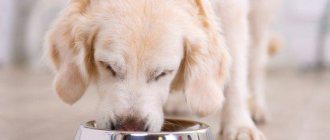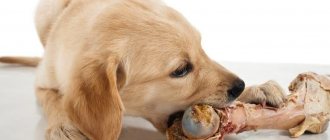When studying the issue of natural nutrition, pet owners often have questions: Can dogs eat eggs? Which eggs are healthier? Is it possible to give raw eggs to dogs? In what form and how often should you feed your pet this product? Let's try to figure this out.
Eggs are a very nutritious food. They are a good source of protein, which is necessary for renewing muscle tissue and strengthening the coat. Eggs contain a lot of folic acid, amino acids and minerals (iron and selenium), vitamins (in particular A, D and B12).
Since a dog is a carnivore by nature, the basis of the diet should be protein products. Bird eggs are well absorbed by the dog's body. Of all protein-based products, they have the highest biological value (even compared to meat). Even the distant ancestors of our dogs - wolves, did not miss the opportunity to feast on a clutch of eggs.
Benefits of eggs for dogs
When used correctly, eggs bring invaluable benefits to dogs' bodies.
They contain:
- protein;
- essential fatty acids;
- fat-soluble vitamins (A, D, E, K);
- trace elements (phosphorus, cobalt, iodine, selenium, zinc, magnesium, iron).
Egg yolks additionally contain fats necessary for the formation of protective cell membranes.
Thanks to this composition, eggs help normalize metabolic processes, strengthen the immune system, properly form the musculoskeletal system, and improve the functioning of the brain and thyroid gland.
Raw or cooked?
Raw eggs are a source of many beneficial substances that are essential for the normal development of a dog. To avoid salmonella infection, the product must be of high quality and fresh.
Also, raw egg whites contain avidin, which impedes the absorption of biotin, the lack of which can lead to disruption of carbohydrate-lipid metabolism and the development of anemia, nausea and muscle pain. Therefore, a product that has not been subjected to heat treatment is allowed to be fed to dogs no more than 1-2 times a week and in combination with other food.
Dogs are allowed to feed both white and yolk. The first is an easily digestible building material for the animal’s body. The second serves as a source of choline, which improves liver function, and omega-3 polyunsaturated fatty acids, necessary for cell membranes, the retina of the eyes and the brain.
In terms of benefits, boiled eggs are not inferior to raw eggs and are almost completely absorbed by the dog’s body.
Content
1. Is it possible to give eggs to a dog without harming its health? 2. What chicken and quail eggs are suitable for dogs? 3. The benefits of eggs 4. Feeding rules 5. The myth about cholesterol
For any novice dog owner, sooner or later the question arises about whether a dog can be given eggs. Here, as in many other aspects of nutrition, there are two radically opposing points of view. Some people claim that this is not normal; they periodically mention cholesterol and other nuances. Others talk about the benefits, since eggs contain a lot of protein and other useful elements of the periodic table that are literally necessary for the animal.
How often and in what quantity should I give?
The number of eggs and the frequency of their introduction into the dog’s diet depends on the age, health and body weight of the animal. An adult dog weighing 30 kg can be fed 1-2 pieces weekly.
When deciding whether to heat-treat a product, many breeders are guided by an unwritten rule: boiled meat - boiled eggs, raw meat - raw eggs.
For puppies
Puppies can be given boiled protein. Raw eggs are contraindicated for babies due to immature immunity. But some breeders recommend feeding puppies with fresh raw protein occasionally.
It is advisable to lightly beat the latter and mix it with porridge or milk. Occasionally, puppies can be pampered with an omelet or a soft-boiled egg. The product should be introduced into the diet of children little by little, starting with 1/3 of a piece once every 7 days.
Gradually, the number of eggs can be increased to the recommended norm - 1-2 per week.
For old pets
Raw eggs are contraindicated for older dogs. They are fed boiled and in quantities not exceeding 2 pieces per week. This addition to the main diet will help maintain the tone of bone and muscle tissue.
Nursing and pregnant women
Pregnant and lactating dogs can be given both raw and boiled eggs. It is useful for females bearing puppies to eat 2-3 pieces per week.
If the eggs are fresh, the recommended amount can be fed to your dog raw. If the quality of the product is in doubt, it must be boiled. Lactating individuals can be given a raw egg one day after birth, but only if the owner is confident in its quality and freshness.
Chicken alternative
Can dogs have milk: why not?
Most people recognize only chicken eggs, although products from other birds can be consumed with no less benefit, including giving to a dog. They are no less useful, and in some qualities they are even superior to chicken ones.
Egg products from geese, ducks and quails are very tasty and healthy for the animal’s body
Goose and duck
The advantage of goose eggs is that they have 4 times more nutritional value than the usual chicken product. This fact must be taken into account when choosing the correct dosage. Otherwise, you can cause diarrhea and indigestion. Too many treats can cause your dog to vomit.
Ducks have the same characteristics as geese. The only difference is the smaller sizes. This is a good alternative to a chicken egg.
Quail, ostrich and others
Some owners of four-legged friends have a question about whether dogs can have boiled quail eggs, whether they will be as beneficial for the dog’s body as for humans. Yes, you can, this product is dietary, it is easily and quickly absorbed. The dosage of a small-sized product increases - one standard one can be replaced with two small ones from quails.
Important! Quails are carriers of a disease called pullorosis. This disease is similar to salmonellosis and is also dangerous to the health and life of the animal.
Is it possible to feed eggshells to your pet?
Dogs can eat not only eggs, but also shells. It is easily absorbed by the body and, due to its high content of magnesium, zinc, sulfur, iron, fluorine and calcium, has a beneficial effect on the condition of the animal’s coat and teeth. The shell is especially useful for puppies during the period of active growth, teeth change and bone formation.
You can prevent salmonellosis infection by first boiling an egg or holding it for 15 minutes in a weak vinegar solution. To prevent sharp fragments from getting stuck between your teeth, it is advisable to grind the shells into flour or fine grains.
An excess of calcium leads to disruption of the musculoskeletal system and the development of osteochondrosis. Therefore, when introducing eggshells into a dog’s diet, you need to carefully monitor the animal’s condition.
We recommend reading: Can I give my dog cat food?
It will also be useful to know: About the benefits of fish oil for your dog.
Well, as an option, find out what is holistic food and the rating of the best food?
Can it cause harm?
Eggs are considered one of the most controversial foods in a dog's diet. In addition to being beneficial, they can cause harm.
In rare cases, when eating eggs, dogs experience:
- Allergic reactions. Manifest in the form of urticaria, dermatitis or severe itching.
- Individual intolerance. Accompanied by the appearance of an unpleasant odor from the ears.
- Increased gas formation and bloating.
- Blockage of blood vessels and formation of blood clots due to high cholesterol content.
- Salmonella infection. Infection occurs only if the egg eaten by the dog is not washed with soap or heat treated.
The protein contains avidin, which destroys biotin in the dog’s body. But this statement is not entirely true. Egg yolk contains enough biotin to compensate for its loss.
Allergy to eggs in a dog
Food allergy is a chronic disease characterized by an abnormal reaction of immune cells to a substance present in food that is recognized as foreign. Often found in dogs, some breeds are more susceptible to this disease than others.
Allergies occur to many healthy foods, and egg products are no exception.
Main symptoms:
- skin itching;
- discharge;
- swelling;
- indigestion;
- unpleasant smell.
Itching caused by allergies is worse than that caused by parasites. Histamine is concentrated in the skin, nerve endings are irritated, the dog begins to itch furiously, bald spots appear in the fur, wounds, weeping spots, and crusts form on the skin. Pathogenic microorganisms can enter combed areas and cause infection.
The appearance of discharge from the eyes, ears, and nostrils is sometimes complicated by conjunctivitis and otitis media.
The dog's face may swell, shortness of breath, and hoarseness may occur.
Gastrointestinal disorder provokes frequent loose stools, the dog loses its appetite and becomes lethargic.
An unpleasant odor spreads from the dog, especially from the mouth.
The cause of the disease is a failure of the immune system caused by:
- hereditary predisposition;
- prolonged stress;
- chronic pathologies;
- features of the nervous system;
- hormonal characteristics;
- helminthic infection.
The disease has no cure; its symptoms are eliminated by adjusting the diet by completely eliminating the allergen. In some cases, medical intervention is required; the veterinarian prescribes antibiotics, antifungals (for infectious complications), antihistamines, and hormonal drugs (for severe itching). Sometimes you have to switch your dog to special hypoallergenic food.
What should you do if your animal feels sick after eating something?
Cases of dog poisoning by eggs are extremely rare.
But the owner must be able to help the pet in a difficult situation:
- Try to induce vomiting to empty your stomach. This can be done with plenty of water. If the dog refuses to drink on its own, the liquid must be infused with a pipette or a large syringe without a needle.
- Try to speed up the elimination of toxins. This can be done using sorbents such as activated carbon. The drugs should be given in a dosage calculated taking into account the dog’s weight.
- Cleanse the intestines with a laxative (magnesia, vaseline oil, Bimin) or a 200 ml enema (warm boiled water, preferably with the addition of vaseline oil).
- Normalize the water-salt balance of the body. You need to pour a solution prepared from 250 ml of water and 1 tbsp into the dog’s mouth. l. salt.
If the dog's condition worsens, the animal must be taken to the vet immediately.
What can be replaced?
If eggs cause an allergic reaction in your dog, they can be replaced with other healthy and nutritious foods, such as:
- Fresh fruits (apples, bananas). The fruits are easily digestible by the dog’s body and saturate it with useful substances, in particular B vitamins, which eggs contain. But some animals have intolerance to fruits.
- Boiled and fresh vegetables (pumpkin, zucchini, carrots, etc.). They are easily digestible, normalize the functioning of the gastrointestinal tract and, due to their high content of vitamins and microelements, will become a complete replacement for eggs. Important! To help dogs better absorb the nutrients contained in carrots, the root vegetable can be finely grated and supplemented with sour cream.
- Legumes and soybeans. The foods are rich in protein, but often cause digestive problems. Therefore, legumes and soybeans can be fed to dogs occasionally and only in boiled form.
- Fermented milk products (yogurt, cheese, sour cream, kefir, cottage cheese). They are distinguished by a high content of calcium, but are rich in casein, which interferes with its absorption and contributes to the acidification of the pet’s body. Therefore, fermented milk products are allowed to be fed to dogs no more than 2 times a week and provided that there is no history of pancreatitis in the animals.
Who can't?
Regardless of what breed your friend is at home, he needs a complete diet. In this case, the funny baby will grow up healthy and strong. Only a healthy dog can be happy and bring joy to its owners.
Therefore, eggs are added to complementary foods, and subsequently to food for all representatives of dog breeds without exception . If the owner has doubts about whether it is worth offering this product to his tailed friend, it is worth consulting with the breeder from whom the puppy was taken or with a veterinarian.
You need to carefully observe the baby’s reactions after he has received a treat, and only then, based on facts and expert advice, draw conclusions about the further formation of the diet.











